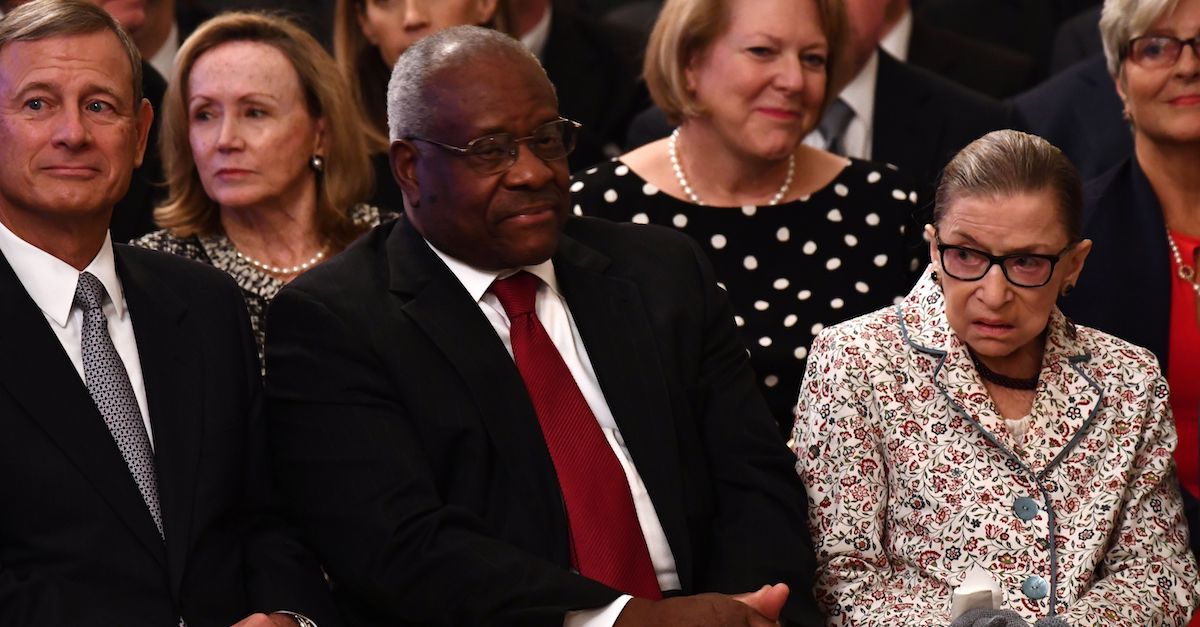
I’m no fan of Clarence Thomas generally, but right now, it sure seems like he’s the only one on that bench with his head on straight. On Tuesday, SCOTUS ruled 8 to 1 in Republic of Sudan v. Harrison; Justice Thomas, the lone dissenter, stood alone delivering a decision siding with some of the most sympathetic litigants of all time – victims of terrorism.
The case was brought by the families and survivors of the 17 killed and 42 injured in the 2000 bombing of the USS Cole. Their lawsuit alleged that the Republic of Sudan provided support to Al-Qaeda terrorists responsible for the bombing. In essence, plaintiffs have already won their case; Sudan defaulted, and the federal court entered a judgment of over $300 million against its government. Collection on that judgment will be another matter entirely, but for now, a technical legal question has risen to the nation’s highest bench: did the plaintiffs provide the Sudanese government proper notice of the lawsuit when the suit was first filed? At that time, the victims and families sent their complaint to the Sudanese embassy in Washington, D.C.
Now, lawyers for Sudan are arguing that the only proper way to serve the Sudanese government was to serve the foreign minister at his address in Sudan. At issue are the specific service requirements set out by Congress in the Foreign Services Immunities Act (FSIA); typically, foreign nations are immune from civil lawsuits, but FSIA sets out an exception that allows plaintiffs to bring lawsuits against state sponsors of terrorism.
Debates over service of process are usually a little heavy on legalese and light on drama, but the underlying issue here is both simple and critically-important. Do we really think that when Congress enacted a law allowing victims of terrorism to sue foreign nations, it expected those plaintiffs to jump through international hoops to notify those foreign nations about the lawsuit? Or did Congress believe that delivering paperwork to the embassies of those nations would be enough? Are we willing to split hairs on service rules that may deprive victims of terrorism a winning verdict?
Before answering those questions, consider this (admittedly overly-simplified) background: when it comes to federal civil lawsuits, the general rule for notification of defendants is that service must be “reasonably calculated” to reach the intended recipients. In other words, if we’re pretty sure the notice would work, we’re good to go.
Tuesday, an eight-member majority of the Supreme Court delivered a seventeen-page analysis in which it looked at everything from dictionaries to the “mailbox rule” in order to conclude that the plaintiffs should have served Sudan by sending process to the foreign minister’s office in Sudan. Serving the embassy isn’t good enough; the statute specifies “the foreign minister” as the recipient, and, as the majority put it, “the minister’s customary office is the place where he or she generally works, not a farflung outpost that the minister may at most occasionally visit.” Talk about a hard-line ruling handed down to the families of Al-Qaeda victims. Rule of law, indeed.
Justice Thomas showed up to deliver a dissent packed with an Antonin Scalia-esque blunt common sense. As Justice Thomas sees it, FSIA doesn’t require a particular location necessary for valid service, but rather that the packet of legal paperwork be sent to “The head of the ministry of foreign affairs.”
And as far as Thomas is concerned, because of “the unique role that embassies play in facilitating communications between states,” the embassy in Washington, D.C. is as good a location as any in Sudan itself. The embassy is perfectly capable of seeing a lawsuit, understanding its urgency, and transmitting the information efficiently.
Thomas is right. Embassies aren’t Amazon lockers; they’re professionally-staffed official government buildings used to dealing with official business. In today’s world of instantaneous communication, there’s no good reason why notice of a lawsuit couldn’t reach its intended target in an appropriate and timely manner – especially when the alternative would require aggrieved plaintiffs to effectuate service overseas.
Harsh a result as Tuesday’s ruling brings about for the families of the USS Cole bombing, the majority was quick to point out that all isn’t lost for their case. This decision, the Court wrote, “is not the end of the road.” The plaintiffs can simply try serving the Sudanese government again—this time, knowing what’s required.
[image via Brendan Smialowski/AFP/Getty Images]
This is an opinion piece. The views expressed in this article are those of just the author.